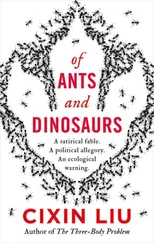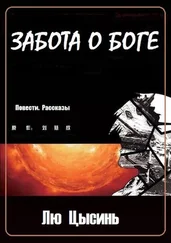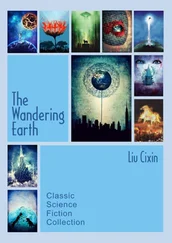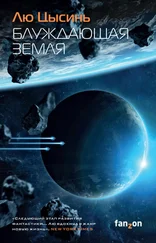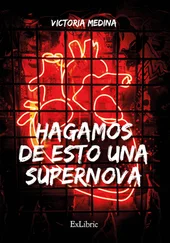Up in the artifact exhibition, the three young leaders continued toward the northernmost gallery. Huahua let out a gentle sigh, and said to Specs and Xiaomeng, “I spoke with the American kids again at the airport this afternoon, but they still refused.”
After the third round, the two sides had held a series of negotiations over details, during which the Chinese side had proposed on multiple occasions that the Chinese children should be allowed to take the most precious artifacts and ancient books with them during the exchange. This suggestion had been firmly rejected by the American children. Benes and her entourage were skilled negotiators who usually expressed their opposition using various evasive approaches rather than saying no directly, but they broke with precedent when it came to this question. No sooner did the Chinese children mention artifacts and books than they stood up from their chairs and repeated “No! No!” while shaking their heads.
At first, the Chinese children thought this was just stinginess, since such artifacts were extremely valuable if not priceless, but they later discovered this was not the case. The American children would have the same right to carry off their own artifacts as the Chinese children, and if the United States did not have many truly ancient artifacts from its few centuries of history, apart from some Native American artworks, institutions like the Metropolitan Museum of Art were chock-full of art and artifacts from around the world worth a king’s ransom. But when the Chinese children proposed allowing American children to take objects from their territory equal in value to the artifacts the Chinese children took, the Americans still flat-out refused.
During preparations for the Shaanxi migration, American members of the Exchange Commission proposed starting with the Shaanxi Museum of History, built in the 1980s, and the location of the Terra-cotta Army, both of which were far more interesting to them than aircraft factories or space-launch centers. They had an astonishingly detailed awareness of the holdings of all of China’s metropolitan libraries and museums, and could easily produce a printed-out inventory of cultural relics.
In a later incident, the Chinese side proposed allowing some American children fluent in both English and Chinese (mostly Chinese-Americans) to remain in the US temporarily to teach English to the Chinese children. Benes agreed, but on one condition: that American children be allowed to take with them many of the Chinese artifacts in the collections of major American museums, particularly scriptures and murals stolen from Dunhuang by nineteenth-century adventurers. This, they claimed, was due to their enthusiasm for Chinese culture, but it was expressed so effusively that the Chinese children rejected it out of hand.
But if the Chinese children were confused by these developments, what often transpired during the ongoing territorial handovers was even more baffling.
Three of Huahua’s classmates, Li Zhiping the letter carrier, Chang Huidong the barber, and Zhang Xiaole the cook, were part of the first group of children to leave their homeland. The three of them had made their way together ever since Candytown. This particular group of kids from the capital were relatively fortunate, since they could ride one of the two Hercules cargo planes and avoid the bumpy torture of the seas. The young pilots had just earned their wings and flew almost drunkenly, making the air journey highly dangerous, but this mattered little to children impatient to arrive in a new world. As soon as they received notice, the three boys raced to pack their things as a wonderful, mysterious future blossomed like a flower in their imaginations.
Li Zhiping stopped off at home on the way to the airport to retrieve a few articles of clothing. He was still in a good mood when he went in the door, but the moment he was about to leave he grew thoughtful. The feeling came so suddenly that he didn’t know what to do. Like those of countless other families living in Beijing’s courtyard homes, his was a sparsely furnished house. The air still held that familiar scent; a calendar from the Common Era was still hanging on the wall.
In a rush the warmth of his childhood days flooded his mind, and the faded images of his mom and dad materialized lifelike before his eyes. It was as if the nightmare of the supernova had never existed, and he had returned to one of those countless afternoons in the Common Era where his mom and dad were about to come home from work. It was all so real that he could practically imagine that the present day was but a dream, that in no way was he about to leave home forever. Then, steeling himself, he brushed aside his tears, slammed the door closed, and dashed over to the bus headed to the airport.
All along the way, he felt as if something was locked up at home, some invisible piece of clothing that he had an urge to go back and retrieve, but he knew that it had become one with the home and could not be carried off. Without the invisible clothing, he felt a sudden bone-chilling cold that disappeared as soon as he looked for something to dispel it, only to stealthily return as soon as his attention was distracted.
The first generation of Chinese children in the Supernova Era were never able to banish that chill from their souls.
The three boys remained in a poor mood all the way to the airport. As they got close, the other children’s jokes tapered off, replaced by silent contemplation. The bus stopped beneath the enormous black body of a Hercules; other huge planes were waiting farther out. The long range of the Hercules meant their next fueling stop would be in Hawaii.
Picking up their few belongings, Li Zhiping, Chang Huidong, and Zhang Xiaole followed the long file of people that led toward the rear entrance of the aircraft and into its dark interior. A few American kids from the Exchange Commission were standing beside the door, white IDs around their necks, carefully inspecting everything the Chinese children carried for compliance with the scope permitted under the rules of the exchange agreement. When Li Zhiping was just a few steps away from the entrance, a spot of green caught his attention, a few blades of grass poking through a crack in the cement of the tarmac. Without a second thought he set down his bag, ran over, and plucked the clump and put it in his shirt pocket before returning to the line.
All at once a few American kids were in his face, pointing at the pocket and shouting “No! No!” followed by a string of English words, which an interpreter translated: The Americans were telling him to leave the grass behind, since it didn’t fall into the category of travel necessities and thus was not covered in the carry-on items described in the exchange agreement. Li Zhiping and the kids around him erupted. Were these punks so petty that they’d stop you from taking a clump of grass as a memento from the land of your grandparents? That’s just being mean!
Li Zhiping shouted out, “I’m gonna take this grass. You’re not gonna stop me! Acting like you’re in charge? This is still Chinese soil!” He held his pocket closed and refused to give up the grass, but the American kids didn’t budge. The stalemate was broken by Zhang Xiaole, who noticed a kid who had just boarded the plane and who was playing with a game system. He shouted to the American kids, “You don’t care that someone’s brought a game with them. What does a clump of grass matter?”
The American kids took a look, and then bent their heads together and exchanged a few words before turning back to Li Zhiping and saying what the Chinese children thought for sure was a mistaken translation: “You can go back home, or someplace else, right now and get your own game system, but the grass has to stay here!” Li Zhiping couldn’t figure out their sense of values, but there was nothing else he could do but silently put the grass back where he had found it.
Читать дальше
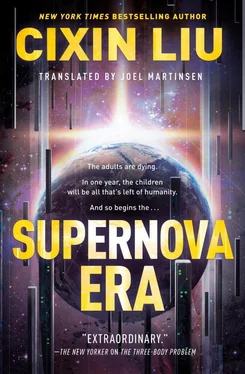
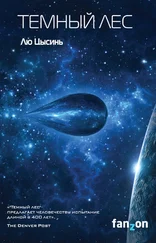
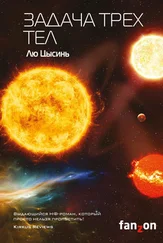

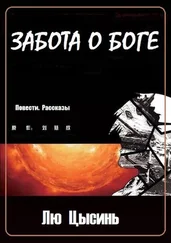
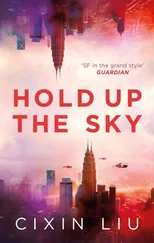
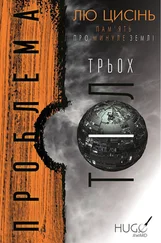
![Лю Цысинь - Эпоха сверхновой [litres]](/books/393110/lyu-cysin-epoha-sverhnovoj-litres-thumb.webp)
